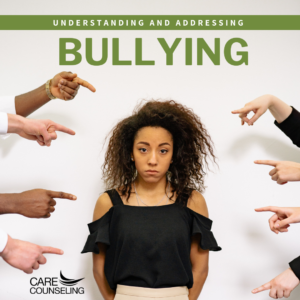Understanding and Addressing Bullying

Bullying is a pervasive issue that can have lasting effects on a child’s emotional well-being and development. As a parent, it’s crucial to equip yourself with knowledge about bullying, recognize the signs, and take proactive steps to address and prevent it.
Understanding Bullying
Bullying is characterized by intentional and repeated aggressive behavior, often involving an imbalance of power. It can manifest in various forms, including verbal, physical, social, and cyberbullying. Understanding the types of bullying helps you identify and address the issue effectively.
Verbal Bullying: This involves using hurtful words, insults, or threats to belittle or intimidate the victim.
Physical Bullying: Physical aggression such as hitting, pushing, or other forms of bodily harm fall under this category.
Social Bullying: Also known as relational bullying, this type involves spreading rumors, excluding individuals, or damaging relationships.
Cyberbullying With the rise of technology, bullying has extended to the digital realm, where individuals are targeted through social media, texts, or online platforms.
Recognizing the Signs
As a parent, being attuned to your child’s behavior and emotions is essential in recognizing potential signs of bullying. Some common indicators include:
– Changes in mood, such as increased irritability, sadness, or anxiety
– Unexplained physical injuries or complaints
– Decreased interest in activities they once enjoyed
– Withdrawal from friends and social situations
– A sudden decline in academic performance
– Loss of personal belongings or frequent requests for money
Addressing Bullying: A Step-by-Step Guide
- Initiate Open Communication
Create an environment where your child feels comfortable discussing their experiences openly. Initiate conversations about their day, friends, and any challenges they might be facing. Listen actively, validate their feelings, and assure them that you’re there to support them.
- Educate Your Child About Bullying
Help your child understand what bullying is and that it’s not their fault. Educate them about the different forms of bullying and encourage them to speak up if they encounter any such behavior.
- Involve School Authorities
If your child is being bullied at school, reach out to teachers, counselors, or administrators. Schools often have anti-bullying policies in place and can take appropriate action to address the issue.
- Teach Assertiveness and Self-Confidence
Empower your child with assertiveness skills to stand up for themselves in a non-confrontational manner. Boost their self-confidence by highlighting their strengths and encouraging them to develop new skills and interests.
- Encourage Positive Social Connections
Foster positive friendships and connections that support your child’s well-being. Encourage them to engage in activities they enjoy and where they can meet like-minded peers.
- Set Boundaries for Online Interactions
In the age of technology, cyberbullying is a real concern. Establish guidelines for your child’s online activities, and educate them about the importance of privacy and responsible online behavior.
- Document Incidents
Encourage your child to keep a record of bullying incidents, including dates, times, locations, and individuals involved. This documentation can be valuable when addressing the issue with school authorities or other relevant parties.
- Seek Professional Help if Necessary
If your child is showing signs of severe distress or their well-being is significantly impacted, consider seeking the help of a mental health professional. Therapy can provide a safe space for your child to process their emotions and develop coping strategies.
- Promote Resilience and Coping Skills
Teach your child how to cope with bullying by promoting resilience. Encourage them to engage in activities that boost their self-esteem, express their feelings through creative outlets, and practice relaxation techniques.
- Be a Role Model
Demonstrate respectful behavior and empathy in your interactions with others. Your actions serve as a powerful example for your child to follow.
Preventing Bullying: A Collective Effort
Preventing bullying requires a collective effort from parents, schools, communities, and society as a whole. As a parent, you can contribute by:
– Teaching your child empathy, kindness, and respect for others
– Monitoring their online activities and promoting responsible digital behavior
– Engaging in discussions about bullying and its impact
– Encouraging them to report any bullying they witness
– Advocating for anti-bullying initiatives and policies in schools and communities
Bullying is a serious issue that demands attention and action from parents. By understanding the various types of bullying, recognizing the signs, and taking proactive steps to address and prevent it, you can create a safe and supportive environment for your child to thrive. Empower them with the skills to handle bullying situations assertively and build their self-confidence, resilience, and strong social connections. Remember that your role as a parent plays a vital part in fostering a world where bullying has no place.



























